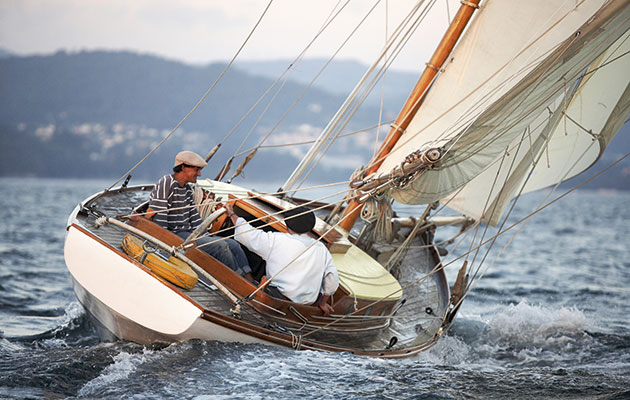Sailing off a mud bank
(Extract two) You are quite entitled to say that to remove a perfectly good Japanese auxiliary engine from Sauntress is an act bordering on madness. And so it may be. But it was done, and once done was rather like having a tooth out. You feel so much better. And so indeed did Sauntress. Always nimble, she positively danced for joy. It was like removing a ball and chain from a haggard prisoner. She came alive.
But at a price. Called experience.

One silvery day. A hazy winter sun. A faint breeze. We slipped, as so many times, the mooring, the ‘we’ being Sauntress and her skipper, as one now, for a little sail, nothing ambitious, poke our nose into Brightlingsea, ‘to be admired’ says the log with proper conceit.
Preening the feathers somewhat, for who does not when their ship is admired, we wafted back across the Colne, past Jimmy Lawrence’s Helen and Violet; past the Colchester Oyster Fishery, past the moorings, bound for the head of the creek for one of those nights at anchor.
It was not to be. A moment’s lapse in concentration and Sauntress gybed and ploughed sedately to a halt in the mud. That would not matter except that it was the very top of the tide, the wind, or what there was of it, was onshore and the tides were, as the saying goes, taking off. Thus there was every chance of being ignominiously neaped.
The log makes bleak reading. Attempts to kedge her off that evening came to nothing. She was stuck for the night, and a long night it was to be, jammed as I was at an angle, listening to the wind moaning, speculating on my chances.
‘Awake at 1 o’clock, start preparing, slow at night with wind now piped up and quite strong, making putting two reefs in the main a slow business, get it right eventually, change foresail, wind now 5 plus, High Water, Sauntress pitching in her hole but sticking, pointing shoreward.’ Still hauling on the kedge, but plainly this is not enough. She just will not budge. There is less water on this tide. And defeat staring bleakly.
Then there came a flash of somewhat belated inspiration. Up went the foresail. Up went the big jib and to hell with the strain. Both backed. Reluctantly Sauntress began to turn in her mud bed until we had the wind fine on the starboard quarter. At least the boat was now pointing into deep water, but it was still not enough and the tide was beginning to run off.
So up with a struggle went the double-reefed main, pinned as it was against the shrouds. And now the force of the wind told. Sauntress heeled, main sheeted in, headsails backed, she heeled still further, more power now than any engine, until reluctantly the mud released its grip and suddenly, heaven be praised, she came clear.
Perspiring profusely, yet chilled to the marrow, the lazy wind as they call it hereabouts cutting like the proverbial knife, there was work yet, for we lay in 18 inches of water on a falling tide with no time to be lost. Conditions the smacks-men on their winter fishing grounds would know only too well, but the ship comes first, and so it was that morning.
Haul in the kedge until almost up-and-down. Chuck aside the useless and sodden gloves in disgust. Back the foresail to break the kedge out, let fly the sheet, gather steerage way, tack again for the creek is narrow and the tide running off, heave her to, get in the anchor, tack again and so on, ever colder until the mooring is reached.
Nobody is about on this bitter February morn. The wind against tide is kicking up a fearsome little sea even here in the creek, all feeling is gone from the fingers, fumble the mooring, fumble again and lose the boat-hook and in sheer desperation heave to, drift down on the darned thing, grab it and jam it behind the shrouds.
Now you can get a line to the bitts, and thence through the eye on the buoy, make the ship tidy, stow the sails, and when all is done, light the stove and begin to thaw out.
‘Utterly spent but quietly triumphant,’ reads the log, for we had done it and done it alone.




